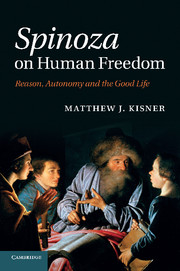Book contents
- Frontmatter
- Contents
- Abbreviations and translations
- Acknowledgments
- Introduction: Beyond therapy
- 1 Freedom as rationality
- 2 Justifying Spinoza's conception of freedom
- 3 Autonomy and responsibility
- 4 Freedom and happiness
- 5 The good
- 6 The natural law
- 7 Benevolence
- 8 The free man
- 9 Rational deliberation
- 10 The character of freedom
- 11 The freedom of the citizen
- Conclusion: “The true freedom of man”
- Bibliography
- Index
5 - The good
Published online by Cambridge University Press: 01 March 2011
- Frontmatter
- Contents
- Abbreviations and translations
- Acknowledgments
- Introduction: Beyond therapy
- 1 Freedom as rationality
- 2 Justifying Spinoza's conception of freedom
- 3 Autonomy and responsibility
- 4 Freedom and happiness
- 5 The good
- 6 The natural law
- 7 Benevolence
- 8 The free man
- 9 Rational deliberation
- 10 The character of freedom
- 11 The freedom of the citizen
- Conclusion: “The true freedom of man”
- Bibliography
- Index
Summary
If we are moved by Spinoza's claims about the importance of freedom from the previous chapter, then we are faced with an obvious practical question: how do free people act? Answering this question is critical for understanding not only how we can attain freedom, but also what's in store for us if we do. While the question is simple enough, its answer is not; in fact, it will occupy the rest of this book. The next three chapters, taking their cue from Spinoza's identification of freedom with rationality, make progress towards answering this question by examining Spinoza's view of reason's practical guidance. This chapter begins by examining his view of the good, since reason, for Spinoza, guides action by determining the value of our various goods, so that we may plan our lives accordingly, as we have seen. So far, I have supposed that the good is simply whatever contributes to our power, a supposition that requires greater explanation and defense, for it glosses over the fact that Spinoza identifies our good with a baffling array of things: what satisfies our desires, the emotions of joy and sadness, what helps us to attain the model of human nature, to name only a few. Consequently, explaining Spinoza's view of the good requires explaining how each of these claims are supposed to fit together.
- Type
- Chapter
- Information
- Spinoza on Human FreedomReason, Autonomy and the Good Life, pp. 87 - 111Publisher: Cambridge University PressPrint publication year: 2011

